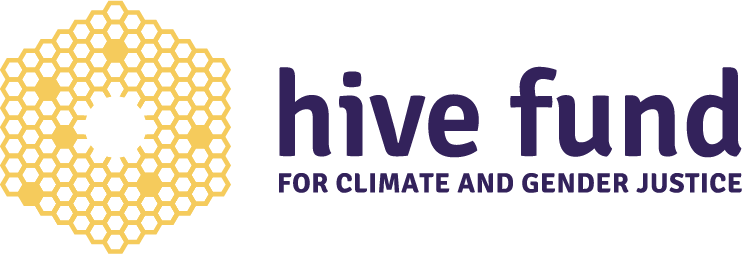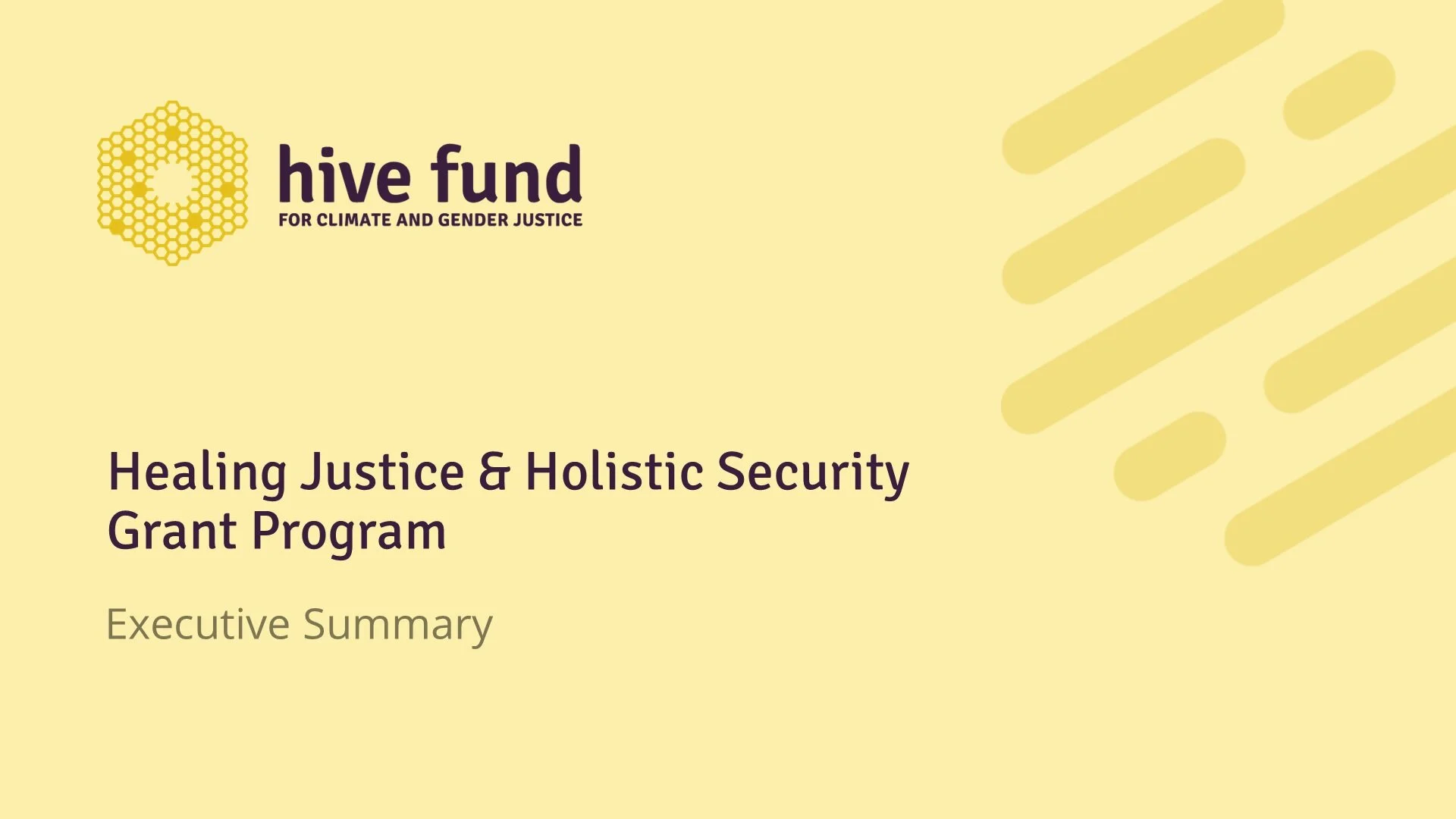Prioritizing Grantee Partner Wellbeing
Almost exactly one year ago today, on what would have been Breonna Taylor’s 27th birthday, the Hive Fund released a statement in support of movements for Black lives and racial justice. Looking back over the past twelve months, each day has held a milestone — the announcement of a verdict, the anniversary of a tragic event, or a fresh trauma that begins the cycle all over again.
These cumulative milestones take a heavy toll on our grantee partners, 95 percent of which are led by Black, brown, or Indigenous women. On top of the daily grind of systemic inequity, most of our grantee partners are making progress in addressing the climate crisis while also being in non-stop crisis mode themselves — from back-to-back elections and legislative cycles, extreme weather disasters, the pandemic, police shootings and other violent acts against people of color, and a tidal wave of attacks on representative democracy.
A common theme across almost all of our grantee partners is emerging: leaders and staff are struggling with exhaustion and burn-out at heightened levels. They are also struggling with strategic uncertainty about pathways to climate justice in this illiberal era filled with conspiracy, disinformation, and alarming suppression of voters of color. Funders often unwittingly add additional burdens in our attempts to support groups on the frontlines of disparity.
Learnings from Hive Fund’s Healing Justice and Holistic Security inquiry
Last fall, Hive Fund hired the Ananse Consulting team to conduct a reflective listening praxis over a four-month period to gauge grantees’ experiences over the past year and better understand the healing and security practices they already use and their healing and security support needs. Here’s some of what we learned.
“A lot of our work is directly tied to trauma: there is hurt and anger. Leaning more into healing and security for staff is important because we mask these feelings in order to provide support into the community. There is potential to get to a place where work is shared and there is allowance for breaks without guilt. The State of Georgia is constantly on fire. This is hard to define while many of our people are experiencing it.”
-Hive Fund grantee partner
Leaders and organizations are burdened by:
Impacts of COVID
Organizational transitions
Election cycles
Threats to physical safety
Structural racism
What’s carrying them through is:
Working in community
Time off
Healing modalities
Childcare support
Financial support
Coaching
Healing, security, and safety in their organizations and communities looks like:
“We have to heal ourselves first if we are going to go out and support the community. It's hard to get people to pause and to slow down. People are conditioned to work at a hyperreactive pace, compelled to respond because there is so much happening. It's a struggle.”
-Hive Fund grantee partner
Working in community
Time off
Healing modalities
Childcare support
Financial support
Coaching
Funders can support them in furthering healing, safety and security practices for themselves, their organization, and their community through:
Funding healing and security practitioners + consultants
Funder peer education about the importance of resourcing healing and security practices
Providing clarity on funding opportunities
Specific grant ideas
Gratitude
General operating funds
Offering support to deepen networks
The needs of executive leaders within grantee organizations stood out in the listening sessions. While leaders were ensuring that staff, members, and communities were receiving care and resources, it was clear there were barriers to them accessing those same resources for themselves. The main barriers to executive leaders accessing healing and security resources include:
“As a Black woman, and mother of three Black children, I am exhausted and disheartened. Time and time again, we bear witness to the stark differences in how Black and white people are treated…from the dismantling of voting rights to destructive highway projects to the lack of enforcement of environmental laws, Black and brown lives have been and continue to be disregarded and cut short. These systemic indignities require more than statements of solidarity…action is needed on all fronts.”
-Dr. Bakeyah Nelson, Executive Director of Air Alliance Houston, Public statement 4/20/21
A multitude of obligations at work and home
Unrealistic demands of funders (i.e. having to respond to funders at any time)
Overidentification with the work (i.e. I am the work, without me the work will not happen)
Cultural norms which emphasize self-reliance
Adjusting Our Practice to Support Grantee-Partners
Organizational leaders are asking funders for deeper awareness of the myriad of responsibilities grantees are juggling, the way funder interactions impact grantees, and the kinds of support funders can offer.
The opposition has perfected the art of strategically overwhelming organizations and communities with a relentless onslaught of policy, legal, and other fights as a means of keeping groups in a reactionary and defensive stance, and pulling them away from enacting bold, proactive visions. For instance, in Georgia, Texas, and other states across the South, groups who broke voter turnout records in a long election season had to immediately turn around and fight back against a tidal wave of dangerous legislation, while increasing cyber and physical security due to threats from white supremacists and responding to baseless investigations and lawsuits.
One of the most important forms of support we can provide is not adding to this overwhelm, by better organizing ourselves as communities of funders and not asking for multiple separate meetings and multiple separate deliverables and separate grant documents for the same handful of groups. In Texas, the Hive Fund is excited to be part of an informal funder collaborative sharing information, aligning on strategy, doing joint meetings with grantees, and educating ourselves about less burdensome and more effective grant practices. The Hive Fund is providing long-term core support to grantee partners, and also funding network and coalition infrastructure, and spaces for grantees to build relationships with each other, repair harm, and do collaborative visioning and planning for the world we hope to create.
In Georgia, the Hive Fund is part of an emerging group of funders intentionally deepening relationships and aligning strategies in an effort to learn together, co-fund, and reduce the burden that funders put on grantees. We’re asking how we might do things differently. Some early ideas include spaces for grantee partners to engage us collectively and lay out their funding priorities to move climate justice forward, and developing funder agreements that outline how we will engage with each other and grantee partners. Our hope is to create a community committed to changing the culture of philanthropy and upending the power dynamics between grantee partners and funders that undermine the ability to work collaboratively.
You can read more about our learnings in our Healing Justice and Holistic Security Grantmaking and Organizational Strategy Executive Summary, and we’ll continue to use this Learning Lab as a forum for sharing ideas, successes and failures. Click here for a collection of Healing Justice and Holistic Security resources.
As each day brings another milestone, we’re working to ensure that our philanthropic practice aligns with the end goal not of a kinder or gentler philanthropy but of an economic and social system that no longer allows the hoarding of wealth and power that make philanthropy possible and necessary.

